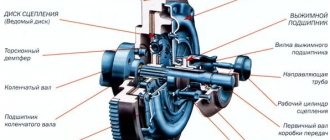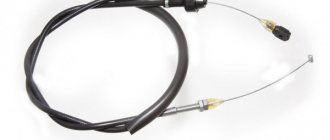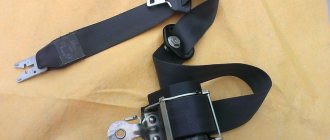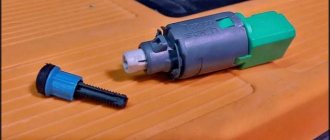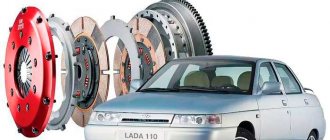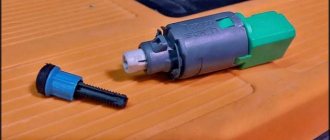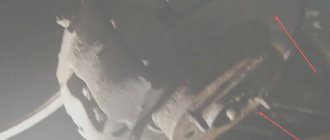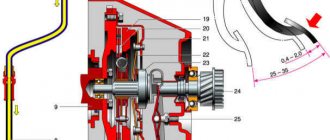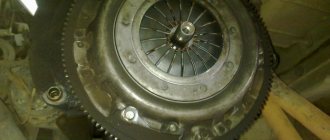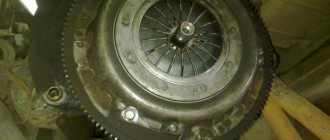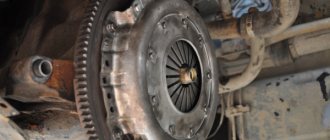Why does a manual transmission howl?
Many manual transmissions, even in good condition, are not very quiet. Even on a new car, the transmission can make sounds while driving, this is especially true for vehicles in the budget segment. For example, the whine of a VAZ gearbox is the norm for many cars. Every owner knows what the normal noise level is inside his car, and will always notice changes. If the noise of the box changes in tone, competes in volume with the sound of the engine, or appears in some specific conditions, you need to think about a visit to a car service center.
Many people confuse noise in the box with malfunctions of other elements. Often, while driving, a worn-out release bearing howls. The volume and tone of the noise directly depends on the speed of movement, so the diagnosis of “box whine” is mistakenly made. A clutch that requires replacement can also cause a similar problem. Without diagnostics, it is difficult to figure out what causes the unpleasant sound, so it is better to contact a car repair shop.
If the manual transmission itself makes a hum, there may be several reasons:
- If there is insufficient lubrication, a hum may occur due to intense friction of parts. The howl is heard especially clearly in higher gears.
- Noise may occur after improper repair of the gearbox. Assembly requires precision. If the shafts and gears are misaligned relative to each other, the box will make noise.
- A common cause of noise is failure of synchronizers. This malfunction is usually accompanied by a grinding noise when engaging certain gears.
- If the noise is present when the gear selector is in neutral, there is likely a problem with the input shaft bearing.
- The pinion bearing may also make a noise.
- Wear of the main pair is another source of box howling. If measures are not taken in time, other parts will also fail.
- If the whine is only heard in a certain gear, the cause lies in the gears. If their teeth are damaged, the box will hum.
- If the box hums when cold, especially in the winter, the culprit may be that the oil is too thick. After warming up, the transmission is much quieter.
- Old oil in a box may contain metal shavings and other impurities. This may be the cause of the noise.
If a howl appears in the box, pay attention when it occurs, whether its pitch and volume changes in different modes. If noise appears when the clutch is depressed, there is a crunching sound when engaging 1st or 2nd gears, there is a high probability of wear of the release bearing. Extraneous sounds when engaging certain gears indicate problems with gears or synchronizers. A humming noise in higher gears or in cold gears may indicate an insufficient level or low quality of transmission oil.
Strange buzzing noise in 1st gear of manual transmission
Friends, hello.
The problem is the following. When starting from a stop, an intermittent rhythmic buzzing sound can be clearly heard in 1st gear, starting from approximately 1000 rpm. Moreover, on the second one you can also hear it, but not so clearly. If you accelerate in first and then put it in neutral, the sound will disappear. Then, if you stick the first one in again, it will happen again, but it will slow down, because... engine braking is in progress. If you drive in first with the clutch, without gas, you can also hear it. Further more into the same pile. In general, I could hear the box rustling. Those. I accelerated, squeezed the clutch, put it in neutral - silence, as soon as I put it in second (without releasing the clutch pedal) - I heard a rustling sound. I have been hearing the rustling noise for a long time, but the buzzing appeared recently. And after such an incident. As usual, I was accelerating from a stop in first place, not to say that it was slow and not too sharp, but normal, and at some point I heard a weak blow/pop and for a moment the car stopped accelerating, then it continued to drive normally. And after a while a sound appeared. The sound is not monotonous, but such a zhu-zhu-zhu-zhu-zhu... with a corresponding increase, the theme is proportional to the increase in revolutions. I will not put forward my guesses for now, so as not to give any direction to your thoughts in advance. I would like to think that maybe I didn’t take something into account when making my conclusions. I’ll just post a video from the recorder. https://youtu.be/E4HTMDwEcaghttps://youtu.be/PNhQ0akxVuQ
The quality of the karnkha has been degraded to reduce the size. THE MAIN THING IS THE SOUND. Acceleration on the first, deceleration on the first.
I would be very grateful for your help.
Mazda 323F (BJ) 1.5 ZL-DE 2000 (pre-styling)
well, remove the gearbox and disassemble it, or the bearing or some kind of gear
Mazda Familia 2001 BJ5W ZL-DE 5MT Toyota Town Ace 1995 CR31 3C-T AT 4WD practicing auto repair
As they say, an autopsy will show. You still need to remove and disassemble the manual transmission
It doesn't matter how slow you go, the main thing is that you don't stop Nissan Primera Camino
It’s common for a person driving a fifteen-year-old car to listen to all kinds of bullshit.
For preventive purposes, change the oil in the box, if it is there.It is difficult to break a manual transmission.
NISSAN TERRANO D10, 2015, 4WD, 2000 cm, manual transmission MAZDA 323F, 1999, 1500 cm, manual transmission
Message from
AlbatrosIt’s common for a person driving a fifteen-year-old car to listen to all kinds of bullshit.
For preventive purposes, change the oil in the box, if it is there.
It is difficult to break a manual transmission.
Well, apparently I’ll start with this... I really don’t want to get into the jungle of the box. I don’t want to find out that some bearing or gear has screwed up in it. I need a car every day =(((
Mazda 323F (BJ) 1.5 ZL-DE 2000 (pre-styling)
try changing the oil, if possible check the level of the old one
Mazda Familia RS special Team DD Russia Autosound Kemerovo https://vk.com/caraudio_bf
Yes, if the bearing is worn out or the gear has overheated and is now starting to sing, then at least change the oil, but who knows what the hell, it might help)))
One of these days I’ll go and change it, I’ll post what and how, if you’re interested))
Mazda 323F (BJ) 1.5 ZL-DE 2000 (pre-styling)
Renault DUSTER 2.0 135 horses 14′ AT Renault LOGAN 1.6 87 horses 09′ MT
Posted by
Mirage 22Yes, if the bearing is worn out or the gear has overheated and is now starting to sing, then at least change the oil, but who knows what the hell, it might help)))
Maybe the level just dropped.
Mazda Familia RS special Team DD Russia Autosound Kemerovo https://vk.com/caraudio_bf
Message from
-nCuX-Maybe the level just dropped.
I do not argue. but just because of this you can burn gears and bearings
Posted by
Mirage 22I do not argue. but just because of this you can burn gears and bearings
which most likely has already happened
Mazda Familia 2001 BJ5W ZL-DE 5MT Toyota Town Ace 1995 CR31 3C-T AT 4WD practicing auto repair
Don't force the atmosphere, guys =))) I'll go change the oil today. What could have caused the level to drop? There shouldn't be any oil waste there... the system seems to be sealed. The korobas was dry the last time it crawled under the bottom.
Mazda 323F (BJ) 1.5 ZL-DE 2000 (pre-styling)
I changed the oil in the box (of which there was a little less than according to the manual), the buzzing noise remained.
By the way, the servicemen concluded that perhaps it was the clutch dying, based on the noises I described. So the next step is to replace this unit. Moreover, it has long been under the gun, because... You can clearly hear that the release bearing is living its last weeks. Requires replacement in any case. After replacing the clutch, I will definitely write about the results. For now we can forget about the topic. The oil, by the way, was somewhat darker than new. Filled with Liqui Moly LM3939 75W-90 GL-4/5. Let's see how it behaves.
Mazda 323F (BJ) 1.5 ZL-DE 2000 (pre-styling)
Posted by
bignautI changed the oil in the box (of which there was a little less than according to the manual), the buzzing noise remained. By the way, the servicemen concluded that perhaps it was the clutch dying, based on the noises I described. So the next step is to replace this unit. Moreover, it has long been under the gun, because... You can clearly hear that the release bearing is living its last weeks. Requires replacement in any case. After replacing the clutch, I will definitely write about the results. For now we can forget about the topic.
The oil, by the way, was somewhat darker than new. Filled with Liqui Moly LM3939 75W-90 GL-4/5. Let's see how it behaves.
This is the best oil that can be poured into mechanics)
Good... Bad... The main thing is who has the gun.
Posted by
Tim13thThis is the best oil that can be poured into mechanics)
I hope this is not sarcasm)) In general, I only pour their fluids into the car.
Mazda 323F (BJ) 1.5 ZL-DE 2000 (pre-styling)
Do you do it yourself or in a service? If you do it yourself, then remove the box, drain the oil and disassemble it. Dark oil indicates wear/depletion - this is my personal opinion. If you just change the clutch, that’s also good, but the howling is unlikely to go away, and you’ll have to remove the box again. Our prices for a foreign car are increased by 30%
Message from
Anton_RandomDo you do it yourself or in a service? If you do it yourself, then remove the box, drain the oil and disassemble it. Dark oil indicates wear/depletion - this is my personal opinion. If you just change the clutch, that’s also good, but the howling is unlikely to go away, and you’ll have to remove the box again. Our prices for a foreign car are increased by 30%
I went to the service center to change the oil; I was very reluctant to crawl on the floor in the garage and practice removing/installing the crankcase protection. I’ll probably pick the clutch myself, because the work alone costs 6,500.
Mazda 323F (BJ) 1.5 ZL-DE 2000 (pre-styling)
Posted by
bignautI went to the service center to change the oil; I was very reluctant to crawl on the floor in the garage and practice removing/installing the crankcase protection. I’ll probably pick the clutch myself, because the work alone costs 6,500.
That’s what we’re talking about, it’s easier to overcome laziness and do it yourself, with a garage... that’s a nice thing
It doesn't matter how slow you go, the main thing is that you don't stop Nissan Primera Camino
Posted by
bignautI hope this is not sarcasm)) In general, I only pour their fluids into the car.
I also use liquid molly 5v-40 in the engine, but we don’t have the original one. About box oil, in my opinion, lm oil is the most expensive. Hado is cheaper. Mobile too. Zeke is also cheaper. Among synthetics for manual transmissions, liquids are the best, I read this on the oil club, but there is generally little written about manual transmission oil
Good... Bad... The main thing is who has the gun.
The howl of an automatic transmission, robot or variator
Automatic transmissions are normally quieter than manual transmissions. If the howl of a manual Niva or Lada Kalina transmission may be a normal condition of the transmission, then third-party sounds from the automatic transmission should alert the car owner. Diagnosing the causes of third-party sounds when operating automatic transmissions is quite difficult. Sometimes computer diagnostics can help identify the problem, but in most cases you have to remove and disassemble the transmission. Having learned the cost of this procedure, many continue to drive a car and drown out the howling with loud music. But this is wrong; with significant wear of all internal components, repairs will cost more than with minor problems. In addition, a faulty transmission can fail at any time.
The main reasons for howling automatic transmission:
- If there is little transmission fluid in the box, usually not only extraneous sounds appear, but also kicks when changing gears.
- If the automatic transmission starts to howl after repair, it may have been assembled incorrectly. Even a slight displacement of parts leads to the appearance of third-party sounds.
- If the axle shafts are poorly secured, play occurs, which leads to noise.
- The quality of the transmission fluid also affects the operation of the automatic transmission. If the oil is old, contains mechanical impurities, or a fluid that does not meet the manufacturer’s requirements is filled in, the box will begin to hum.
- Worn or damaged gears, bearings and other mechanical parts lead to the appearance of extraneous sounds.
An automatic transmission is a rather complex mechanism compared to a manual transmission, which is why it is more difficult to identify the cause of the howling. But even if you need to disassemble the transmission with troubleshooting, it is better to perform this procedure than to face a critical breakdown along the way.
5. The car does not respond immediately when changing gears
If the car seems to “wrinkle” when changing gears (the car reacts late after changing gears), then this is a clear sign of a transmission malfunction. Also, if the car does not move smoothly when moving from a standstill, then there is a problem with the clutch.
What to do if the box howls
The first thing a car owner should think about when a howling noise appears in the transmission is a transmission fluid leak. Inspect the car's riser for oil stains, assess the oil level in the box using the dipstick, which most car models have. If the transmission fluid level is below the minimum mark, it must be topped up immediately. Use only the brand of oil that comes in the box. You cannot mix liquids from different manufacturers. You should know that automatic transmissions are very sensitive to the level of lubrication, so an overflow of transmission fluid is as unacceptable as a lack of it. If the oil has not been changed for a long time, it should be done. Automatic transmissions are especially sensitive to the quality of transmission fluid.
If it was not possible to eliminate the howling of the box by replacing or adding oil, you need to go to a service station for diagnostics. Specialists will assess the condition of the transmission and tell you how much repair is needed.
If you decide to sort through the box, you should take into account that the cost of such work is quite high. That is why it is advisable to purchase new original spare parts. Only in this case can you count on a long service life of the transmission after repair. Buying used spare parts or cheap parts from a dubious manufacturer is an imaginary savings. There is a high probability that soon after such repairs the gearbox will have to be disassembled again.
If the main pair is damaged, it is rarely possible to get by only by replacing it. Usually in such a situation other parts also suffer, so you need to evaluate their condition and, if necessary, also replace them.
Sometimes repairing a box turns out to be very difficult and expensive. In this case, it is advisable to replace the entire transmission. You can buy a new unit or find a used box in working condition.
Should I use additives?
There are special additives for gearboxes. Is it worth using them, will they solve the problem of transmission whining?
Additives are effective in preventing breakdowns. Many of them can significantly increase the service life of the transmission. If a minor malfunction occurs, using these products will help temporarily get rid of the noise and delay repair time. But you shouldn’t hope to restore the parts; sooner or later they will have to be replaced anyway.
If the box is severely worn, and even more so if it fails, additives are ineffective. In this case, you shouldn’t spend money on auto chemicals; it’s better to go straight to the service center.
Additives for automatic and manual transmissions differ in their properties. Use automotive chemicals designed for the type of transmission installed in your vehicle. Avoid using products from dubious manufacturers. At best, they will have no effect, and at worst, they will lead to more serious problems.
Noise additive in gearbox
As you can see, you can give an affirmative answer to the question whether the automatic transmission can hum. At the same time, as in any other unit, noise in an automatic transmission can appear for various reasons (wear, malfunctions, loss of properties of ATF transmission oil, etc.). It is also a common situation when noise appears in the automatic transmission after changing the oil. This is often due to the fact that unsuitable oils are used, errors were made during replacement, etc.
Owners often note that noise in the automatic transmission occurs in neutral and in parking; in some cases, noise in the automatic transmission appears when the car is stationary or in motion when the gear is engaged. It also happens that the problem manifests itself only under certain conditions and modes (for example, noise in the automatic transmission when engaging reverse gear or howling of the automatic transmission during acceleration).
In any case, the problem needs to be solved. Moreover, in the case of a manual transmission, unlike an automatic transmission, it is easier to determine the cause of the malfunction and also to eliminate the defect. If the release bearing of a VAZ 2114 is humming, the noise in the gearbox disappears when the clutch is pressed, the howling of the Lada Granta gearbox is noticed, specialists from any car service center know how to fix the problem and get rid of the noise and howling.
Moreover, the list of “childhood” diseases allows you to quickly find out why the gearbox on a Lada Granta or other car with a manual transmission is humming. At the same time, diagnosing a manual transmission actually does not take much time. The repair itself is also often limited to changing the oil and replacing the manual transmission clutch or, in the worst case, rebuilding the transmission and replacing worn parts.
When it comes to automatic transmissions, both on domestic and foreign cars, everything is much more complicated. Owners often ask why the gearbox hums on a Lada Granta automatic transmission, or the automatic transmission howls on a Nissan, Lexus, Audi or BMW. So, in this case, diagnosing the cause is difficult and expensive. It is for this reason that quite often owners of cars with automatic or manual transmission begin to look towards additives.
As is known, an additive in a manual transmission to reduce noise or an additive in the transmission oil of an automatic transmission in some cases can reduce or completely eliminate the appearance of extraneous sounds. In practice, manufacturers of such compounds promise normalization of unit operation, increased service life, softer and smoother operation of the automatic transmission, etc.
There are a large number of products from different manufacturers on the market, and among additives for automatic transmissions we can single out Liqui Moly and Xado. In the first case, the Liqui Moly ATF Additive is quite popular.
This additive in automatic transmissions has a positive effect on the oil, slows down its aging and oxidation, and also helps restore the elasticity of rubber and plastic seals. This property makes it possible to stop oil leaks through oil seals, gaskets and seals.
At the same time, intensive cleaning of the hydraulic unit channels occurs, a protective film is formed on the parts, which improves the operation of the box, reduces noise and eliminates extraneous sounds. According to the manufacturer, ATF Additive increases the service life of the automatic transmission.
This additive can be mixed with any ATF fluids, since the composition does not contain additives that can lead to the loss of properties of the base oil or lead to swelling of the rubber. In fact, the additive has the same components as oil, only in high concentration. The composition does not affect the coefficient of friction, that is, there is no risk of friction clutches slipping, etc.
You can also select XADO revitalizant (gel-revitalizant EX120) for automatic transmissions. This solution protects the box from wear and tear and is also a means of partial (restorative) repair. According to the manufacturer, the Hado automatic transmission additive protects surfaces and restores rubbing parts, which allows you to get rid of noise.
A special metal-ceramic coating is formed on the surfaces, and the geometry of the parts is restored. Revitalizant itself can be used in all types of automatic transmissions, added to any oil, since the additive does not enter into chemical reactions and does not cause changes in viscosity, friction, or other physical and chemical properties of ATF.
conclusions
The howling of a Renault, Lada Vesta, Grant or any other car is a problem that cannot be ignored. A working transmission does not make any strange sounds, so if they appear, go to a service center as soon as possible. The sooner the diagnosis is carried out, the cheaper the repair will cost. If you constantly postpone this event, then the howl may end in buying a new box.
The gearbox is a rather complex unit, especially when it comes to an automatic transmission. Do not trust repairs and diagnostics to random people. It is better to contact a specialized auto repair shop that has the necessary equipment and tools.
VAZ checkpoint, a frequent source of howling.
Worn synchronizers are a source of increased noise. For replacement.
A worn input shaft bearing is another enemy of silence.
A faulty release bearing is a frequent source of additional noise.
edit this post
